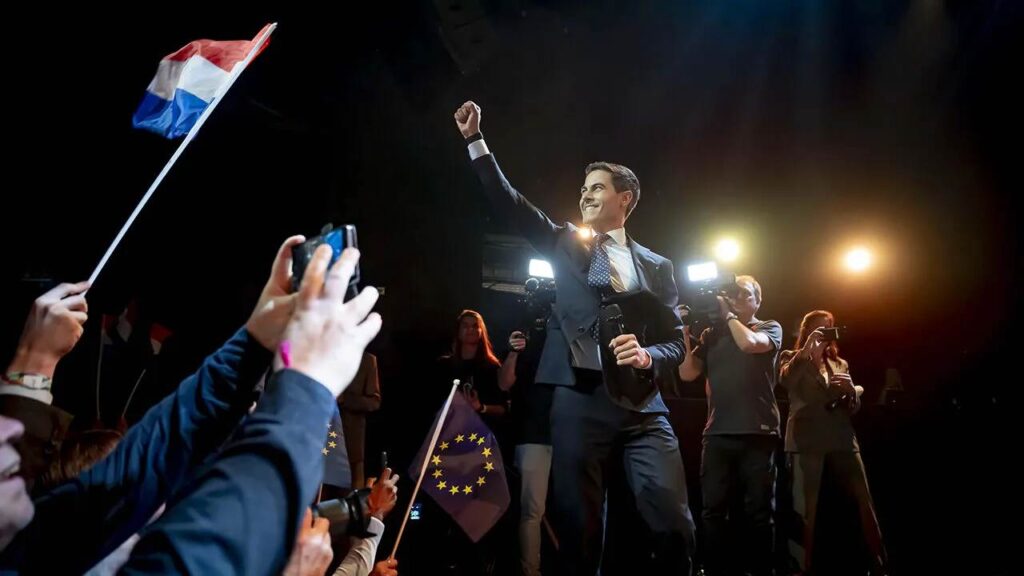
Dutch Centrist Party D66 Wins Election, Rob Jetten Set to Become Youngest Prime Minister
Fundacion Rapala – The Dutch centrist party D66 has officially won the general election, according to news agency ANP. This result places 38-year-old Rob Jetten on track to become the youngest prime minister in Dutch history.
With almost all votes counted, D66 holds an insurmountable lead over the far-right Freedom Party (PVV) led by Geert Wilders. The result signals a major shift toward moderation in a country long marked by political division. Dutch voters appear to have chosen stability and progress after years of heated debates over nationalism and immigration.
The outcome also highlights a renewed appetite for pro-European, liberal leadership at a time when populism has gained ground in several European nations.
A Symbol of Modern Leadership
Rob Jetten’s journey to political prominence has been rapid and inspiring. Known for his calm demeanor and strong communication skills, Jetten represents a new generation of Dutch leadership. His campaign focused on climate action, affordable housing, and education reform issues that resonated deeply with younger voters.
His energetic presence and digital-savvy outreach strategy helped transform D66 from a mid-tier party into a national powerhouse. Jetten’s ability to present complex policies in simple, relatable terms earned him trust from both urban professionals and working-class families.
Speaking to supporters at The Hague, Jetten said, “This victory belongs to everyone who believes in progress through cooperation, not division.” His words reflected the optimism that defined D66’s campaign from the start.
“Read More : he Fed Faces a Crucial Test: Rate Cuts Amid a Data Blackout and Government Shutdown”
A Tight Race and a Symbolic Win
The election was one of the closest in recent Dutch history. Early results showed a near tie between D66 and PVV. However, as final votes were tallied, D66 secured around 18% of the total, ensuring its victory.
Even with this win, Jetten faces a familiar Dutch challenge forming a coalition government. D66 will need at least three partners to secure a majority in the 150-seat Lower House. Negotiations are expected to take months, as parties debate fiscal policy, energy goals, and migration reforms.
Still, analysts agree that the D66 campaign’s message of unity and progress struck a chord with voters. Political commentator Marieke van Dongen noted, “Voters wanted competence, not confrontation. Jetten gave them that choice.”
The Decline of Geert Wilders and the PVV
For Geert Wilders, leader of the far-right PVV, this election marks a significant setback. After his surprise win in 2023, Wilders aimed to expand his influence and push anti-immigration policies further. Yet, D66’s positive and inclusive campaign undercut his momentum.
Despite some rural support, the PVV lost ground in major cities. Wilders acknowledged defeat but maintained that his party deserved a role in shaping the next government. However, most mainstream parties have already ruled out forming a coalition with him.
Political expert Hans Vermeer from Leiden University observed, “Wilders’ confrontational style may have energized his base but alienated moderates. Jetten, by contrast, offered balance and optimism.”
“Read More : GOP Oversight: Autopen Pardons ‘Void’? What the Final Report Says and What It Doesn’t”
European Reactions and the Broader Impact
The D66 victory drew reactions across Europe. With its pro-EU stance, many European leaders view the result as a boost for centrist politics amid rising populism.
German Chancellor Annalena Baerbock congratulated Jetten, calling the result “a win for European cooperation and democratic values.” French President Emmanuel Macron also expressed optimism, noting that D66’s success could strengthen ties between the Netherlands and France in addressing climate and energy challenges.
Brussels-based analyst Sofia Leclerc stated, “This outcome reminds us that moderation and pragmatism still have a strong base in European politics.”
Coalition Building and Challenges
With victory secured, Rob Jetten now faces the complex process of coalition negotiations. Analysts predict potential alliances with Labour (PvdA), GreenLeft, and possibly the VVD. However, these parties differ sharply on taxation, energy investment, and defense spending.
Economists warn that maintaining fiscal discipline while delivering on ambitious climate goals will be Jetten’s biggest challenge. At the same time, public expectations for reforms in education and digital innovation remain high.
If Jetten succeeds in uniting these diverse factions, he could reshape Dutch politics and set a new example for moderate governance in Europe.

A Generational Shift in Dutch Politics
The victory of D66 under Rob Jetten marks more than a political transition it represents a generational and ideological shift. For many Dutch citizens, Jetten embodies a future where rational policymaking and collaboration replace populist confrontation.
In his closing speech, Jetten stated, “The Netherlands has chosen cooperation over division. Let’s build a fair, sustainable future together.” His message reflects not only hope but a renewed belief in consensus-driven politics.
As coalition talks begin, all eyes are on how Jetten turns this symbolic win into lasting political stability. Regardless of the outcome, the Netherlands has entered a new chapter one led by youth, moderation, and the promise of progress.